This post covers the campaign rules for setting up the tabletop terrain and how the campaign map has an influence. There are some aspects of the terrain cards I have covered off in previous posts, but have repeated them briefly for completeness.
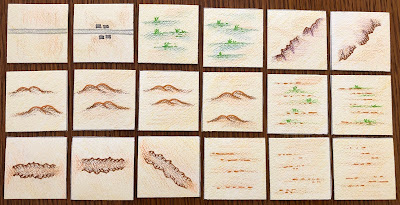 |
| Terrain cards containing: road, road/village, 2 marsh, 2 escarpment, 4 hill, 2 scrub, 3 wadi/rough terrain, 3 open. |
The first step is to shuffle and start drawing cards until a square of 9 cards is completed. Some cards which are drawn are discarded based upon terrain features on the campaign map using the following guidelines:
- Marsh cards are ignored if there is no marsh feature in the campaign zone being battled over.
- Cards with roads/tracks are ignored if there is already a card containing a road already drawn.
- Escarpment cards are ignored if there is no escarpment feature in the campaign zone being battled over.
- Open cards are ignored. If there is already an open card selected when there are mountain features in the campaign zone being battled over.
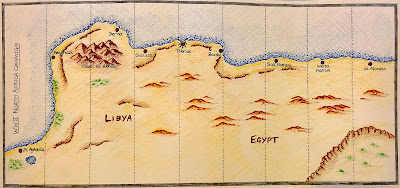 |
| Campaign map |
Once the 9 cards are selected:
- The defending player selects their base edge
- The defending player can switch two adjacent terrain cards backwards and forwards (vertically as pictured)
- The attacking player uses the opposite table edge and can switch two adjacent terrain cards sideways (horizontally as pictured)
Here are the cards for the first battle of campaign turn 2.
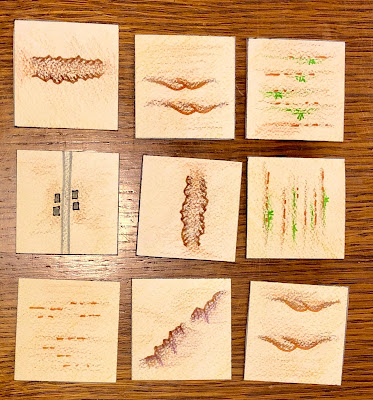 |
| 9 cards are selected. When drawing the cards a 2nd road and a marsh card were ignored. |
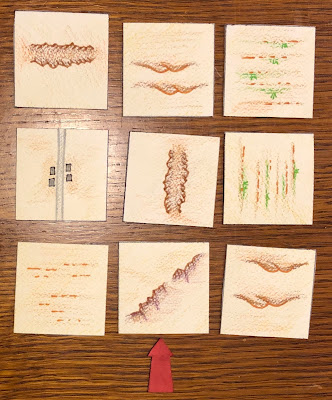 |
| Allied forces select the base edge. |
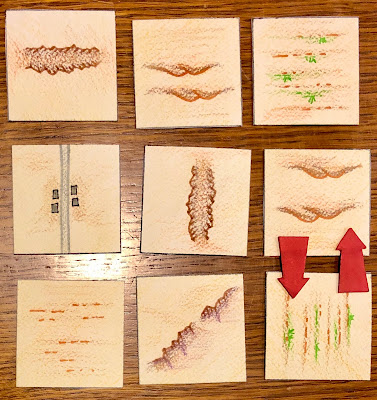 |
| Allied forces switch any two adjacent cards (vertically) |
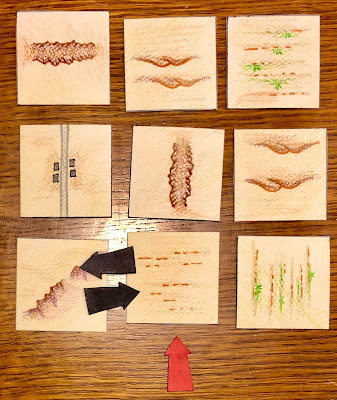 |
| Axis forces switch any two adjacent cards (horizontally) |
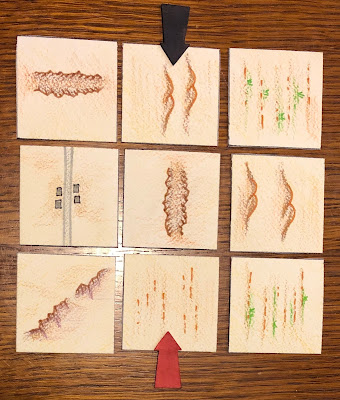 |
| Terrain determined and ready to be transferred to the tabletop. |
The tabletop I am currently using for this campaign is hex based and is 13 hexes wide by 10 hexes deep.
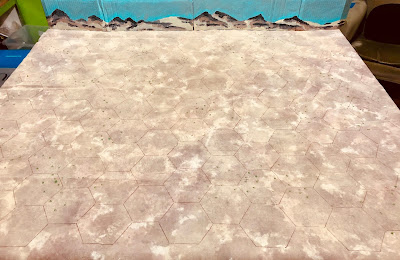 |
| Tabletop with a battered cardboard backdrop 13 hexes wide by 10 hexes deep |
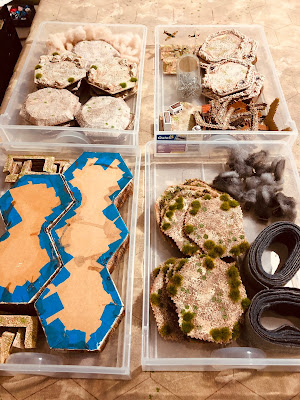 |
| All the terrain fits nicely into 4 plastic draws. |
When transferring the cards to the tabletop the following dimension of hexes is used to reflect the cards.
 |
| The tabletop is divided into areas |
I use the following as a guide for laying features on the tabletop:
- Place roads first and they run from one base edge to the other. All other terrain will fit around the road.
- 3 terrain features per area
- If a feature cannot fit, eg escapements due to a road, I use a short 2 hex escarpment and hill.
- Wadi/Rough terrain must be one feature of 2-3 hexes
- Marsh terrain must be one feature of 2-3 hexes
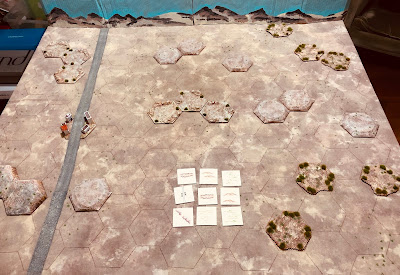 |
| A completed tabletop |
The next post will cover the rules for setting up the forces involved in the game.
During this week I managed to have a Jacobite game using my Paper Soldiers. They are all from the Peter Dennis book and are photocopied to increase their size to 42mm.
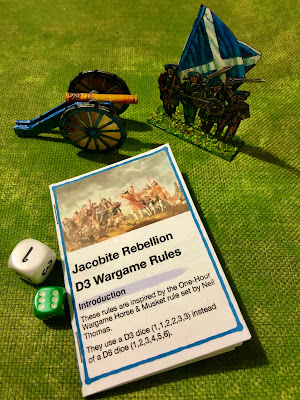 |
| Rules written up in zine format. |
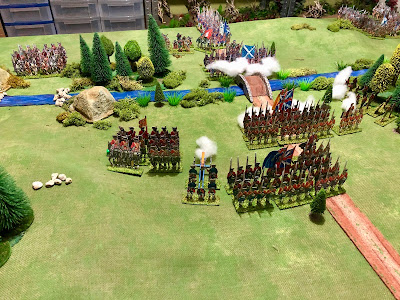 |
| Scenario 18 from One Hours Wargames is well underway |
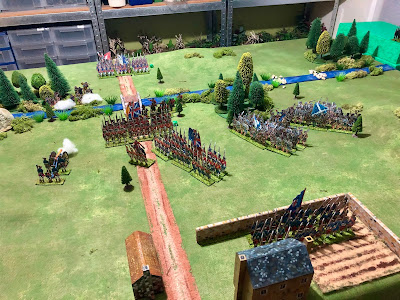 |
| The Highlander counter attack is well underway |














Peter, you continue to make good progress on your campaign system. As someone remarked on an earlier post, perhaps you should consider publishing this system commercially. With your rules, superb hand drawn maps, and a few battle reports, this might be a hit.
ReplyDeleteI may well write up the rules for this campaign and post them on this blog. I think the time and skill required to make anything of commercial quality means I will remain happily in the enthusiastic amateur category.
DeleteThanks for typing up that explanation. That Jacobite game looks fantastic too.
ReplyDeleteThank you. I do like getting the Jacobite paper soldiers on the tabletop.
DeleteThanks Peter - the guide is coming along nicely. I also look forward to see how you modified Tank on Tank. I have downloaded the free rules so thanks for that lead as well.
ReplyDeleteThanks. I like simple rules and the Tank on Tank rules are very nicely written and fun to play.
DeleteI am also wondering if your terrain set up method could also be used with other simple rules such as KISS Rommel or PZ8.
DeleteSimon
It should be possible.
DeleteAhh, now I get it, that makes a lot of sense! Thanks a lot, Peter, for taking the time to show your method for determining and setting up the table, I appreciate it!
ReplyDeleteV/R,
Jack
Most welcome. Thanks.
DeleteAn interesting post Peter. Upscaling the paper soldiers to 42mm was a great idea, the impact is significant .... and so much cheaper than 40mm lead!
ReplyDeleteI do like the paper soldiers in a larger scale as they are easier to cut out and the artwork can be seen.
DeleteThanks for the guide to how you set up the terrain Peter and am looking forward to the next instalment.
ReplyDeleteGlad it is of interest. Thanks.
DeleteThanks for sharing more details about the clever campaign system, and I must agree, your paper soldiers look excellent!
ReplyDeleteThanks. The paper soldiers look surprising effective.
DeleteI have to agree with Mr. Freitag, I'd pay for a copy of your rules, artwork and related materials. I've supported Bob Cordery's work over at http://wargamingmiscellany.blogspot.com/ He has published a number of books that are one version or another of his Portable Wargame system. He even puts them on lulu.com for sale.
ReplyDeleteI can't make you do it, but I would support you.
I will be writing up the rules and will be making them available. Thanks for your interest.
Delete